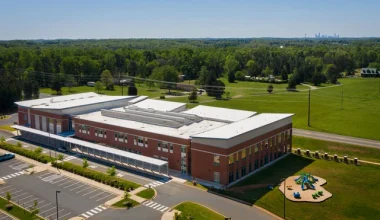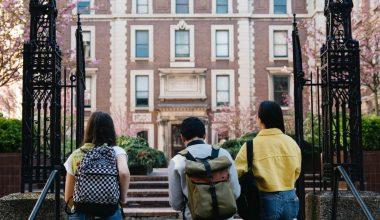As a teacher, you can make a good first impression on your students’ parents during back to school night. The easiest way to do this is to make an itinerary.
Making a back to school night itinerary and adhering to it as closely as possible is critical because there is little time and much stuff to cover. With it, you will be confident that you will cover all of the important themes, and the parents will get all of their inquiries in a pleasant and structured manner.
Most schools provide a back to school night where parents and children can tour the classroom, meet the teachers, and learn more about the next academic year.
Finding classes and getting to know teachers is the major goal for the children.
In this article, we will explain all you need to know about back to school night for parents, kids and even teachers.
Table of contents
- What Is Back to School Night?
- Why should you Attend a Back to School Night as a Parent?
- Six Steps to a Successful Back to School Night
- What is the Important information to take away from Back to School Night?
- What is the List of Questions Parents Can Ask During Back to School Night?
- What is the difference between Back to school night and parent orientation night?
- Is Back to School Night Necessary?
- A Sample Back to School Night Schedule for Teachers
- In Conclusion
- References
What Is Back to School Night?
Most schools offer a back to school night for the parents of their kids; it allows parents to form relationships with their child’s school’s many teachers, helpers, and administrators.
Back to school nights are held at each grade level (elementary, middle, and high). The night arrangement for elementary and high school may differ, but most provide the same information about the regulations, curriculum, schedules, etc.
See also: How Long is a School Bus? Everything You Need to Know
Why should you Attend a Back to School Night as a Parent?
These are a few reasons why you should attend this crucial school ritual.
#1 Meet the Teacher
Unless you have been involved with the school system for a long time and have multiple children, you may need to be more familiar with every teacher in your child’s school.
You will be assigned a teacher or a group of teachers for your child a few days to weeks before the start of school or from the previous year. When you meet the instructor, you can get to know them better. Email addresses can also be exchanged. You can fill out a form about your child provided by the teachers. This allows the teacher to get to know them better.
They also supply brochures with their contact information for you to keep for your records.
#2 A Chance ability to ask Questions
Back to school night is the best time to ask the teacher about expectations, ground rules, and instructional approaches.
Some questions parents can ask include;
- What grades will my child get this year?
- How can you tailor your training to the specific needs of each student?
- What options do I have if my child struggles in a subject or requires further assistance?
- Can I come and volunteer in your class?
- How can I get in touch with you?
- Is there anything on the general school supply list you don’t require, and what resources do you need for your class?
#3 Learn the Rules
At back to school night, you can learn the core standards and specifics for the classroom and school.
Many professors briefly summarise the regulations for anything from schoolwork to punishment procedures.
Your teacher may even give you a pamphlet that you must sign. A middle or high school principal may give a presentation outlining the general policies and guidelines outlined in the student handbook.
#4 Curriculum and Timetable
Although private and public education systems share a fundamental curriculum, each instructor has a unique approach and teaching style. This is the time to learn about their various teaching tools, how they organize their classroom, and how you can help your child at home.
Elementary school teachers, for example, may review their reading and other assignments. You can learn about the teacher’s late work and homework policies during a high school back-to-school night.
#5 Going to the Classroom
One of the advantages of back to school night is the opportunity to visit a classroom.
You will be able to see your child’s seat, the classroom materials, the various accommodations made by the teachers, and the basic arrangement.
It allows you to see the world through your child’s eyes.
#6 Participate in Volunteering
Teachers want you to be involved in your children’s education. A volunteer sign-up page is usually for anything from providing snacks to assisting with field trips.
You can also provide the instructors with a timetable so they know which parents can volunteer at different times.
#7 Talk to other parents
You meet not only teachers but also other parents. It can help you make contact and exchange contact information with the parents of your children’s peers.
You will also have the opportunity to meet some other parents with whom you may work or volunteer for the academic year.
See also: How Many Weeks Are in A Typical School Year in 2023?
#8 Create a plan
Unless your child is an only child, you will almost always need to meet with several teachers. Make an effort to meet any teachers your children will learn under.
If your high schooler had the same elementary instructor as their elementary teacher, you would be familiar with how they run their classroom and may want to meet with the high school teachers instead.
If you have many kids, they may be divided. One parent might, for instance, go to the elementary school teacher, and the other might go to the middle school teacher.
Think strategically to maximize your time and cover as much ground as possible.
#9 Improve Teacher Understanding of Your Child
Since many persons are vying for the teacher’s attention, reserving individualized inquiries regarding your child or using an email or one-on-one meeting is advisable.
You can, however, provide the teacher with a quick statement about your child. Numerous teachers may query this in the form, but you can be ready with a full explanation.
Be sure to take note of their interests, fun choices, allergies, and any behaviour concerns. This can help the instructor get to know your child before the school year starts.
Six Steps to a Successful Back to School Night
#1 Ask if you can bring the children
Your school’s administration may have a “no children” rule for back to school night because they believe parents should be able to focus on meeting the teacher and paying attention to their presentation.
However, more and more schools are starting to provide childcare at the school for the evening because they understand how difficult it is for parents to schedule daycare, get the kids home, and then get the kids back to school. Ensure to ascertain your institution’s policies and take the proper steps.
#2 If you need to visit more than one child’s classroom, come up with a strategy
If you have more than one child enrolled in school, you must plan ahead of time.
Suppose your older child previously had a teacher who is now your younger child’s teacher. In that case, you may decide that visiting your older child’s teacher is the primary priority for the evening.
You can divide and conquer or alternate, taking turns in the different classrooms if both parents can attend.
#3 Bring along a pen and paper
Students and parents are asked to be prepared to take notes: For example, if the teacher says you may call me, and these are my conference hours, you must write down that information.
Teachers may also offer information using PowerPoint or writing something on the board.
#4 Do not ask specific questions about your child
Ask any questions about the course material, outings, or grades, but only ask questions about your child that would be helpful to other parents. Instead, organize a conference to speak with someone personally about your concerns.
#5 Be ready to volunteer
There will be various opportunities to help in the classroom or for school-wide activities. You’ll be more prepared if you’ve considered your time constraints and how you’d like to contribute to the school community.
#6 Bring a message for your child’s teacher
If your child’s teacher still needs to request it, now is a great time to write them a letter explaining your child’s character, academic history, and any potential problem areas. They will appreciate the information.
What is the Important information to take away from Back to School Night?
#1 Summary of your child’s school day so far
Elementary school teachers will review the class’s usual daily and weekly schedules. This information will aid you in determining the best time to assist in the classroom. For example, if the teacher seeks parent volunteers to assist with problem readers, you must know when the class is reading.
#2 Knowledge of how the classroom appears
Take a look around the room; Is it well-organized? Is it welcoming and comfortable? Is the space cluttered? Also, is it stimulating and educational to young minds if it is cluttered? What’s on the walls and bookcases might tell you a lot about the teacher. You’ll also be able to look at the students’ textbooks, journals, portfolios, and artwork.
#3 What it’s like to sit in your child’s seat
Teachers frequently request that parents take their child’s seat. This enables teachers to link parents with children mentally and allows parents to experience the classroom through their child’s eyes.
#4 The homework and discipline policies
The homework policy should indicate how much homework is assigned each night and on weekends, how it is scored, when it is due, and how much it counts toward the overall grade.
#5 How to Contact the Teacher
Find out how to reach the teacher and whether they prefer voicemail, email, or notes for correspondence.
What is the List of Questions Parents Can Ask During Back to School Night?
A Californian teacher suggests you ask the following questions for a back to school night.
- What are the rules for make-up work and tardiness, and how does it affect the student’s grade?
- What effect do absences have on a student’s grade?
- How can I assist my child in gaining independence in middle school?
- How can I track my child’s academic development? Do weekly progress reports exist?
- Is a homework calendar available online, and how can I find my homework?
- Should I send an email or call the instructor?
- Do field trips occur?
- How can I learn about detentions or behavioural issues?
- Is there anything else I can do for you?
- Can I volunteer in the classroom?
What is the difference between Back to school night and parent orientation night?
The main difference between back to school night and parent orientation night is the intent and timing of the meetings. Several schools have back to school nights several weeks to a month after the start of the school year, while other schools hold parent orientation sessions one or more times during the first week of school.
Parent orientation night benefits include:
- Early communication between educators and administrators helps avoid misunderstandings.
- Parents are more likely to be allowed to bring their children, and teachers will take advantage of the opportunity to get to know the children and give them a sneak look at the classroom to assist them in acclimatizing to the school year.
- The PTA or PTO can immediately include parents.
Back to school nights have the following advantages:
- Parents can see their children’s classroom work.
- Teachers will get to know their students.
- The normal classroom juggling that occurs during the first few weeks of school while teachers balance student counts have diminished, and parents feel confident in the teacher assigned to their child.
Is Back to School Night Necessary?
Although it is not required, parents are strongly encouraged to attend back to school nights.
A presentation and vital handouts with information essential for starting school are frequently included, such as simple brochures with information about the school year’s calendar, holidays, emergency contacts, bus timetables, and more, as well as the class schedule and locker placements for older students.
See also: What are Remedial Classes? and how to Start in 2023 | FAQs
A Sample Back to School Night Schedule for Teachers
Use the sample Back to School Night itinerary below as a reference for the main points of your presentation.
- Distribute (or display via presentation) the evening’s agenda to parents so they know what to expect.
- In a few phrases, describe yourself, including your educational background, teaching experience, interests, and warm-hearted personal characteristics.
- Describe the breadth and order of the curriculum you will cover with the students over the academic year, display textbooks, and present a quick overview of the student’s knowledge at the end of the year.
- Using the daily plan, give an example of a typical day in your classroom. Include which days of the week are dedicated to special activities such as physical education or library trips.
- Mention important school calendar dates, such as major vacation days, field trips, assemblies, carnivals, etc.
- Review the classroom and school policies and procedures and consider having parents sign a statement admitting their awareness of the classroom rules and acceptance of the related consequences.
- Inform parents about the opportunities for classroom volunteering, including your needs and the tasks of each job, as well as the location of the volunteer sign-up form.
- Allow parents to ask you questions in a group setting, and only spend time replying to questions that affect most students. Questions about children should be treated differently.
- Distribute your contact information, preferred means of communication, and the regularity with which parents may expect to hear from you (a class newsletter, for example), and introduce the room parent if applicable.
- Allow parents to walk the classroom, checking out the whiteboards and learning stations. You could even arrange a little scavenger hunt for parents as a fun way to show them around the classroom. Don’t forget to remind them to leave a small note for their children.
- Thank everyone for attending.
FAQS for Back to School Night
Most schools offer a back to school evening for the parents of their kids. It allows parents to form relationships with their child’s school’s many teachers, helpers, and administrators.
What can you do on a school night?
Scavenger Hunt
Guessing Games
Parent Bingo
Name Alliteration Game
Student/Parent Journal Entry
Parent Quiz
Is a homework calendar available online, and how can I find my homework?
Should I send an email or call the instructor?
Do field trips occur?
How can I learn about detentions or behavioural issues?
Is there anything else I can do for you?
Can I volunteer in the classroom?
In Conclusion
Back to School night is a fantastic opportunity to learn more about the institution, program, guidelines, and faculty working with your child in the coming academic year and a small window into their academic life.
It may be difficult to fit it into your schedule, but it is well worth it. It is also a fantastic way to build relationships with teachers and energize your children for learning.
References
- Thought.co – back to school night 2023
- Greatschools –back to school night 2023
- Family.lovetoknow – back to school night 2023




